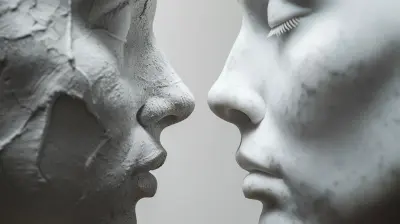24 March 2025
Trauma. A word often whispered behind closed doors but one that affects so many of us. Whether it's from a single event or a series of experiences, trauma can leave deep emotional scars that impact how we express ourselves. But how exactly does trauma influence our emotional expression? And more importantly, how can we heal from it?
In this article, we’ll dive into the intricate relationship between trauma and emotional expression, and we’ll explore the various ways you can begin the healing process. Stick with me — this might just be the guide you need to start unpacking those emotions.

What Is Trauma?
Before we dive into the deep end, let’s first lay down the foundation. Trauma, in its essence, refers to an emotional response to a distressing or disturbing event. It’s the psychological aftermath of experiences that overwhelm our ability to cope. This can include anything from a car accident, physical assault, emotional abuse, or even the loss of a loved one. But here's the thing — trauma isn't just about the event itself. It’s also about how your mind and body respond to that event.Some people might experience an immediate shock. Others might seem "fine" on the surface, but internally, they’re fighting a battle. Over time, if unprocessed, trauma can shape the way we see the world, interact with others, and express our emotions.
Types of Trauma
Trauma doesn't come in a one-size-fits-all package. Broadly speaking, trauma can be classified into three main types:1. Acute Trauma: This results from a single, isolated incident like a car accident or a natural disaster.
2. Chronic Trauma: This occurs when you’re exposed to repeated or prolonged distressing events, such as childhood neglect or long-term domestic violence.
3. Complex Trauma: Often rooted in childhood, this type of trauma emerges from multiple traumatic events over time, typically within relationships.
Regardless of the type, trauma changes how we perceive and process emotions. You might be wondering: why does trauma have such a grip on our feelings?

How Trauma Affects Emotional Expression
Emotions are, in many ways, the language of our souls. They tell us how we’re doing, what we need, and how we relate to the world around us. But trauma can throw a wrench in that emotional machinery. Let's break it down step by step.Emotional Numbing: The "Shut Down" Mode
One of the most common ways trauma impacts emotional expression is through emotional numbing. Imagine a thermostat that’s been turned down so low that you barely feel anything. After a traumatic event, it’s not uncommon for people to shut down emotionally as a defense mechanism. You may feel disconnected, detached, or like you’re watching your life from the outside, unable to fully engage.This emotional numbing serves a purpose — it protects you from feeling the full intensity of the trauma. But over time, it can leave you stuck, unable to access joy, love, or even sadness. It’s like being trapped in a glass box where nothing can touch you, but you can't touch anything either.
Hyperarousal: The Fight-or-Flight Response on Overdrive
On the flip side, trauma can also make you hyperaroused, where your emotions are constantly on high alert. It’s like your brain is stuck in a permanent state of fight-or-flight, always expecting danger. This heightened emotional state can make it hard to relax, and small triggers can cause you to react in ways that feel out of proportion to the situation. Imagine trying to have a calm conversation, but your body is convinced you’re standing in front of a lion. It’s exhausting.Difficulty Trusting Others
Trauma, especially relational trauma like abuse or betrayal, can make it extremely difficult to trust others. You might find yourself questioning people's motives or withdrawing altogether. When trust is broken, expressing vulnerability becomes a challenge. And without vulnerability, emotional expression is often stifled.Emotional Overwhelm and Outbursts
For some, instead of feeling nothing, trauma might make them feel everything — all at once. If this sounds like you, you might experience emotional overwhelm, where your feelings seem too big to contain. This can lead to emotional outbursts, crying spells, irritability, or even anger. It’s like trying to hold back a flood with a dam that’s too small. Eventually, the water is going to burst through.The Role of Triggers
Have you ever noticed how certain situations, smells, or even songs can suddenly bring up intense emotions? Those are triggers — reminders of the trauma. Triggers can cause you to react as if the trauma is happening all over again. They can hijack your emotional expression, making you respond in ways that feel disconnected from the present reality.
How to Heal: Reclaiming Your Emotional Expression
Healing from trauma isn’t about "getting over it." You don't simply move on and forget it happened. Healing is more about integrating the experience, understanding how it’s shaped your emotions, and learning how to express those emotions in a healthy way. Here’s how to start:1. Seek Professional Help
Let’s be real: trauma is complex. And while reading this article can give you some insights, working with a mental health professional (like a therapist) can provide the tailored support you need. Therapies like Cognitive Behavioral Therapy (CBT) and Eye Movement Desensitization and Reprocessing (EMDR) are specifically designed to help people process and heal from trauma.2. Practice Mindfulness and Grounding Techniques
For those who feel emotionally overwhelmed or numb, mindfulness exercises can be incredibly beneficial. Mindfulness helps you stay present with your emotions without getting swept away by them. Grounding techniques, like deep breathing or focusing on physical sensations (like the feeling of your feet on the ground), can help anchor you when emotions feel too intense or when you're triggered.3. Reconnect with Your Body
Trauma often disconnects us from our bodies. Activities like yoga, meditation, or even simple stretching can help you reconnect with yourself physically. When you start to feel more in tune with your body, emotional expression often follows. It’s as if your body holds the key to unlocking those emotions you’ve been bottling up.4. Journaling: Putting Emotions into Words
Sometimes, the hardest part of emotional expression is figuring out what you're feeling in the first place. That’s where journaling comes in. Writing down your thoughts and emotions can help you untangle the mess of feelings inside. It’s like having a conversation with yourself, giving your emotions a safe space to be heard.5. Embrace Creativity
Art, music, dance — these are all powerful tools for emotional expression. Sometimes, words fall short. Creative outlets can help you express emotions that feel too big or too painful to articulate. Whether it’s painting your feelings, dancing out your frustrations, or writing a song, creativity can help you process trauma in a way that feels natural and freeing.6. Build a Support System
Healing doesn’t happen in isolation. Surround yourself with people who understand and support you. Whether it's close friends, family, or support groups, having a community can make a world of difference. Sharing your feelings with others helps normalize emotional expression and reminds you that you’re not alone in your struggles.7. Give Yourself Time and Grace
This might be the most important tip of all: be patient with yourself. Healing from trauma is not linear. Some days you’ll feel like you’ve made great progress, and other days the weight of it might seem unbearable. That’s okay. You’re human, and healing takes time. Give yourself grace as you navigate the ups and downs.
Final Thoughts
Trauma can deeply impact how we express our emotions, but it doesn’t define us. Understanding how trauma affects your emotional world is the first step toward healing. With the right tools, support, and patience, you can reclaim your emotional expression and live a life that feels authentic and whole.Healing from trauma is a journey — and while it may take time, you are absolutely capable of finding your way. Just remember: your emotions are valid, your healing is possible, and you are not alone in this.







Noelle McConkey
This article effectively highlights the profound effects of trauma on emotional expression, emphasizing the importance of understanding these impacts for healing. It offers valuable insights into therapeutic approaches and coping strategies, encouraging readers to embrace their emotions as a path toward recovery and resilience.
April 6, 2025 at 3:16 AM